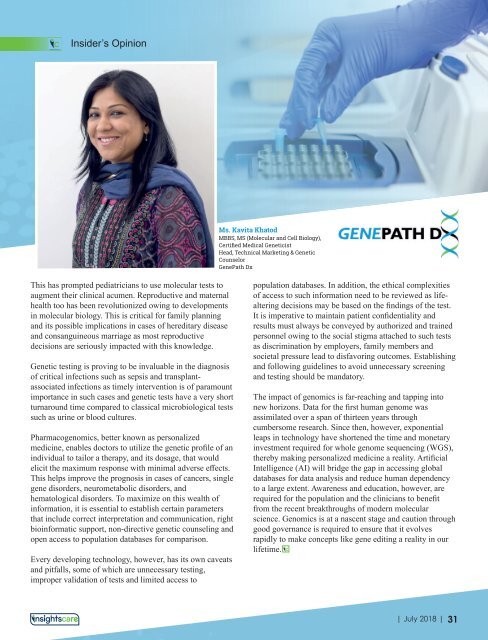The 10 Most Innovative Digital Healthcare Solution Providers 2018
You also want an ePaper? Increase the reach of your titles
YUMPU automatically turns print PDFs into web optimized ePapers that Google loves.
Insider’s Opinion<br />
Ms. Kavita Khatod<br />
MBBS, MS (Molecular and Cell Biology),<br />
Certified Medical Geneticist<br />
Head, Technical Marketing & Genetic<br />
Counselor<br />
GenePath Dx<br />
This has prompted pediatricians to use molecular tests to<br />
augment their clinical acumen. Reproductive and maternal<br />
health too has been revolutionized owing to developments<br />
in molecular biology. This is critical for family planning<br />
and its possible implications in cases of hereditary disease<br />
and consanguineous marriage as most reproductive<br />
decisions are seriously impacted with this knowledge.<br />
Genetic testing is proving to be invaluable in the diagnosis<br />
of critical infections such as sepsis and transplantassociated<br />
infections as timely intervention is of paramount<br />
importance in such cases and genetic tests have a very short<br />
turnaround time compared to classical microbiological tests<br />
such as urine or blood cultures.<br />
Pharmacogenomics, better known as personalized<br />
medicine, enables doctors to utilize the genetic profile of an<br />
individual to tailor a therapy, and its dosage, that would<br />
elicit the maximum response with minimal adverse effects.<br />
This helps improve the prognosis in cases of cancers, single<br />
gene disorders, neurometabolic disorders, and<br />
hematological disorders. To maximize on this wealth of<br />
information, it is essential to establish certain parameters<br />
that include correct interpretation and communication, right<br />
bioinformatic support, non-directive genetic counseling and<br />
open access to population databases for comparison.<br />
Every developing technology, however, has its own caveats<br />
and pitfalls, some of which are unnecessary testing,<br />
improper validation of tests and limited access to<br />
population databases. In addition, the ethical complexities<br />
of access to such information need to be reviewed as lifealtering<br />
decisions may be based on the findings of the test.<br />
It is imperative to maintain patient confidentiality and<br />
results must always be conveyed by authorized and trained<br />
personnel owing to the social stigma attached to such tests<br />
as discrimination by employers, family members and<br />
societal pressure lead to disfavoring outcomes. Establishing<br />
and following guidelines to avoid unnecessary screening<br />
and testing should be mandatory.<br />
<strong>The</strong> impact of genomics is far-reaching and tapping into<br />
new horizons. Data for the first human genome was<br />
assimilated over a span of thirteen years through<br />
cumbersome research. Since then, however, exponential<br />
leaps in technology have shortened the time and monetary<br />
investment required for whole genome sequencing (WGS),<br />
thereby making personalized medicine a reality. Artificial<br />
Intelligence (AI) will bridge the gap in accessing global<br />
databases for data analysis and reduce human dependency<br />
to a large extent. Awareness and education, however, are<br />
required for the population and the clinicians to benefit<br />
from the recent breakthroughs of modern molecular<br />
science. Genomics is at a nascent stage and caution through<br />
good governance is required to ensure that it evolves<br />
rapidly to make concepts like gene editing a reality in our<br />
lifetime.<br />
| July <strong>2018</strong> | 31
















